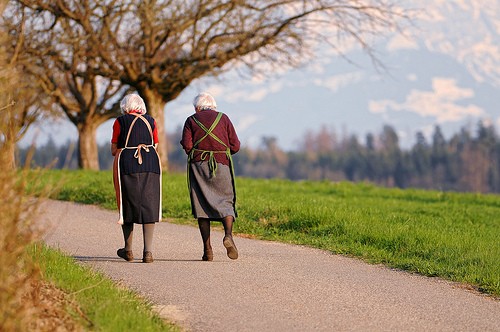
Walking can help prevent cognitive decline at old age, latest research shows.
However, researchers from The University of Kansas in US also found that living in a community that encourages walking was also equally important to get the desired effect.
Amber Watts, assistant professor of clinical psychology at the University, noticed that the overall appearance of a neighbourhood and the facilities it offered – whether it had walking trails or trees -- influenced a person's decision to walk regularly. However, safety always topped the list.
"For older adults, safety is a key issue in walkability," Watts said in a news release. "That includes things like traffic lights that give ample time to cross, sidewalks that are in good repair, and benches to stop and rest."
During the study, the authors monitored 64 people. Of the total, 25 people suffered from mild Alzheimer's disease and the rest (39) were healthy and were not suffering from any cognitive issues.
Researchers used space syntax to calculate walkability and compared it to the scores each participant received in cognitive tests.
The test included various tasks including memorising words immediately and after a gap; and rearranging numbers and letters mentally. The participants were also screened for dementia.
The study found solid evidence to prove that characteristics of a neighbourhood determined a person's lifestyle and health.
Participants living in an easy-to-walk community fared well both physically and mentally. They had a lower body mass and blood pressure, and also scored high in memory tests.
Most importantly, the researchers found that a complex environment helped improve cognition in old people.
"Complex environments may require more complex mental processes to navigate. Our findings suggest that people with neighborhoods that require more mental complexity actually experience less decline in their mental functioning over time," Watts said.
"We think this may be because mental challenges are good for us. They help keep us active and working at that optimal level instead of choosing the path of least resistance," she added.
Findings of the study were presented at the Gerontological Society of America's annual meeting held in Washington, D.C., last week.
How Walking can benefit the Old People
The World Health Organization (WHO) recommends that old people aged 65 or above should perform 150 minutes of aerobic physical activity or 75 minutes of vigorous-intensity aerobic physical activity throughout the week.
Following are some advantages associated with engaging in regular physical activity at old age as proven by previous research and provided by experts from ageUK and Arthritis Foundation:
- Prevents brain shrinkage, onset of dementia
- Lowers risk of heart failure
- Protects against cancer, mainly breast, womb and colon
- Lowers risk of diabetes
- Boosts mental health
- Strengthens bones and protects against osteoporosis
- Prevents weight gain
- Improves quality of sleep

















